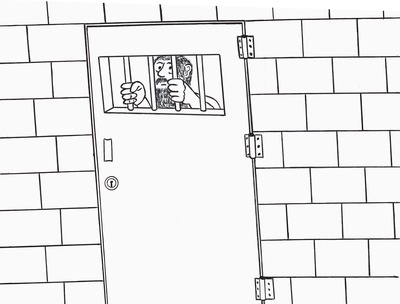
Georgia Prisoners on Hunger Strike Since February 9

Prisoners in the Georgia State Prison SMU have had enough of the oppression and decided to take a true stand to fight for our rights. Prisoners in the strike include many of the same prisoners from the 9 December 2010 and 11 June 2012 hunger strikes, and these prisoners are refusing to eat until conditions change.
On 25 January 2014, prisoners received trays at the SMU lockdown with bugs in the food. And after the bugs were pointed out by the prisoners to staff, they were told that either they eat the food or don’t eat at all. Then when the prisoners tried to keep the trays to show the proof to the warden they were threatened by the daytime Officer in Charge, that if they didn’t give up the trays he was going to suit up with his Correctional Officers and gang rape the prisoners. The prisoners still refused to give up their trays and were threatened again the next day: if they didn’t give up the trays they were going to be refused their tray meals for that day. The prisoners had to go two days without eating just to show the warden the bugs in their food. And when the prisoners finally got a chance to show the bugs in the food, the warden only replied that it’s nothing but a little bit more meat to add in their chili. This is not the first time that bugs had been served in food, but nothing has been done about this issue. Even though we file grievances, nothing but denials.
These prisoners have even been beaten by staff while in handcuffs. Nothing has been done about these employees’ abusive actions. There is a coverup by Warden Bruce Chatman, Deputy Warden June Bishop, Warden of care and treatment William Poinel, Cpt. Micheal Nopen, Lt. Michael J. Kyles, aand even down to medical staff Mary Tsore and mental health staff Mr. Whitmoore.
Georgia prisoners are being denied access to the law library as guaranteed by the Georgia and U.S. law. Prisoners are only allowed two court cases per week to be delivered at their door on a piece of paper, and no books.
Medical staff are refusing to take notice of the hunger strike even though SOP VH47-0002 guarantees strikers health service.
The legal system refuses to respond, grievances are ignored or destroyed, and there is very little that Georgia prisoners can do to fight for their rights. Our only choice is to put our lives in danger by refusing to eat, and plead for some outside support.
MIM(Prisons) adds: The past few years have seen a sharp increase in prisoners using food refusal as a tactic to demand some improvements in conditions. Considering the powerlessness of prisoners, and the complete failure that is the grievance system in many states, it is not a surprise that people feel their only option to demand basic rights is to starve themselves.
We print many reports on these strikes in the pages of Under Lock & Key, and we know this inspires others to learn of similar struggles across the country. But we also encourage everyone to study these actions and learn from their mistakes. In Illinois, prisoners were manipulated by the pigs to end their strike prematurely. In South Carolina lockdown coordination problems ended their strike. In Nebraska prisoners failed to make clear demands and gained nothing after a two day protest. Even in California where prisoner unity is remarkably high, the response to the massive hunger strikes has been little more than lip service and program name changes. We must be prepared for such lack of response from the state with a long view of how to make change.
The underlying lesson in all of these struggles is the need for stronger education and organization before taking action. Greater unity will be achieved through education, and organization will build a solid system of communication and a strong and winnable list of demands. One quick lesson for all: when sending information to the media about your strike include something clear that people on the outside can do to support you. It can be a number to call or place to write to register their support.








